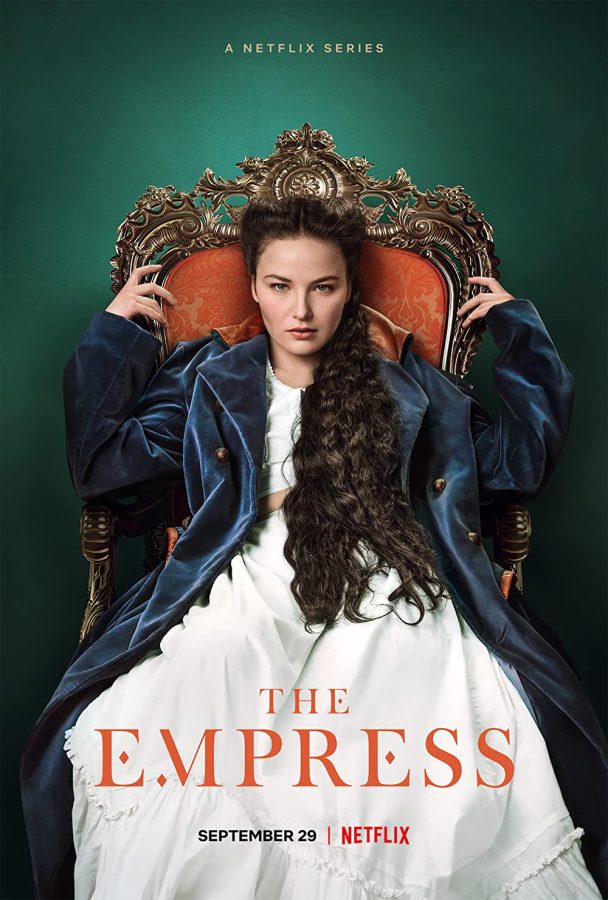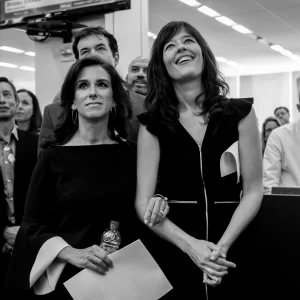Royalty In Modernity: A Dive Into “The Empress”
Katharina Eyssen’s period drama, “The Empress,” boasts international success; it’s also a sign of the times.
NETFLIX
Netflix’s “The Empress” received massive praise alongside a global burgeoning interest in royalty and monarchy.
January 25, 2023
Last year saw the release of some of the most popular series in recent history, with streaming heavyweights such as “Heartstopper,” “House of the Dragon” and “Wednesday” dominating Anglophone pop culture. However, one series in particular drew international attention away from its English-speaking rivals.
German actress-turned-writer Katharina Eyssen’s new period drama, “The Empress,” was released on Netflix on Sept. 29, 2022. The show revolves around the radical life of Empress Elisabeth “Sissi” of Austria during the exceedingly conservative 19th century and is delivered entirely in German (although a lackluster English dub is provided). The show was a global hit; during its peak, it managed to secure its place as the second-most watched Netflix series worldwide for two consecutive weeks, only trailing behind the American hit series “Dahmer — Monster: The Jeffrey Dahmer Story.”
Since its debut, “The Empress” has cemented itself as one of the most successful Netflix releases from continental Europe, rivaled by the likes of “Elite” from Spain and “Lupin” from France. What is essentially a biopic of Elisabeth masterfully portrays a glimpse into the dynamics and machinations of one of Europe’s most reactionary courts during the 19th century.
Royal marriage, however, constitutes the first step before the raison d’être of royalty itself: succession.
In an era dominated by towering series productions with multimillion-dollar budgets and a burgeoning East Asian film and animation production industry, how did this unassuming German period drama captivate an international audience? The answer, perhaps, lies beyond show business.
“The Empress” follows a slew of recent royalty and nobility period drama successes — namely, “The Crown” and “Bridgerton” from the United Kingdom, “The Serpent Queen” from the United States, and “Marie Antoinette” from France. In fact, “The Empress” is not even the most recent retelling of the story of Elisabeth. “Corsage” (2022), written and directed by Austrian filmmaker Marie Kreutzer, details the story of the Austrian royal’s obsession with beauty later in her life. Though the period drama has long proven to be a successful formula, its recent prominence can be partially attributed to the abrupt ascent of modern royalty to the media spotlight.
In October of 2021, the former Princess Mako (now Mako Komuro) of Japan’s imperial family thrust the ancient institution into the spotlight when she announced her marriage to Fordham Law graduate Kei Komuro, School of Law ’21, her college sweetheart and a commoner in the eyes of the Japanese Imperial Household Law. In doing so, the princess abdicated all of her royal duties, as well as the inheritance and status that comes with those duties. The former princess’s decision to effectively leave the Japanese royal family made global headlines and kicked off a year that saw a surge in the popularity of royal families.
Less than a year later, in June 2022, the Princess Märtha Louise of Norway also renounced her royal status in favor of marriage to a commoner. Her engagement to American shaman Durek Verrett drew national criticism in Norway that paralleled the attention that Komuro received in Japan.
As shown in “The Empress,” royal marriages are incredibly publicized affairs that are often arranged to increase the prestige and popularity of the next generation of royals. As such, both praise and backlash are intense experiences for newlywed royals — Prince Harry’s marriage to Meghan Markle, for example, elicited a much different and more negative public reaction compared to his brother Prince William’s marriage to Kate Middleton.
Royal marriage, however, constitutes the first step before the raison d’être of royalty itself: succession. That much is emphasized in “The Empress” as well, with the titular character often clashing with her mother-in-law, the Archduchess Sophie of Austria, over the matter of producing an heir.
Royal succession has also recently been thrust into the public spotlight following the death of Queen Elizabeth II last September and the subsequent accession of King Charles III to the British throne. The late queen’s funeral broke records to become the most televised and watched event in human history and saw the attendance of every other remaining royal family in the world, ranging from the Saudi to the Spanish royal families.
The queen’s death formally challenged the place of monarchy in the modern world. In one case, it prompted the late queen’s distant cousin Queen Margrethe II of Denmark to strip most of the Danish royal family’s titles, with only her immediate family remaining as royalty — a decision that reverberated throughout the Danish tabloids.
While the multitude of royal incidents in the past year certainly helped to catapult the rise of royalty in popular media, the appeal of “The Empress,” along with its many other period drama contemporaries, continues to lend itself to the imagery of bygone eras of grand, absolute monarchs. In today’s turbulent political climate, both within the United States and abroad, the idea of leaders that are publicly perceived to be infallible, sophisticated and otherwise “perfect” sounds incredibly appealing.
“The Empress,” beyond its beautiful settings and costumes, its engaging story and its cast of talented actors and actresses, tells a story of someone who was born to rule and who wholly devotes herself to the good of her people. Royalty’s ascent in both fictional and real popularity represents our yearning for faultless leaders to rally around in an age where it seems that no political figure is without flaws.












